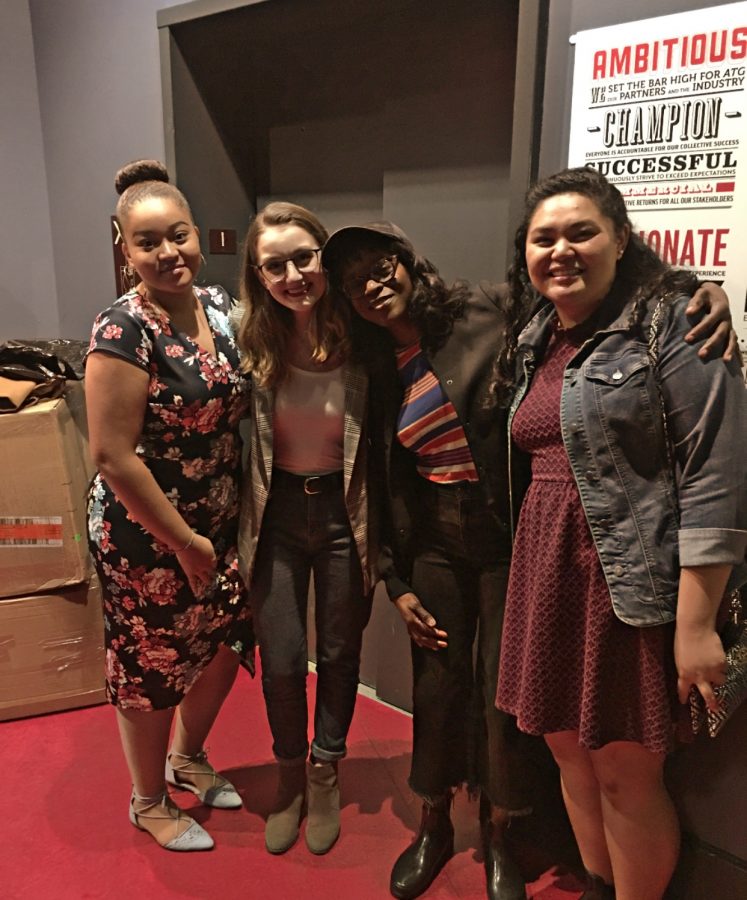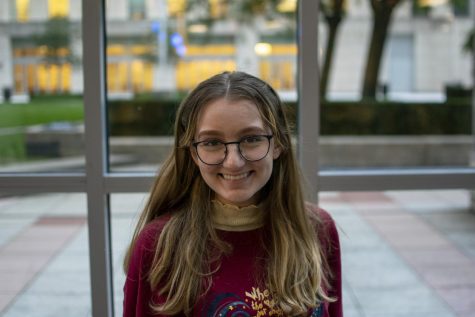From Harvard to ‘Harry Potter’
Actress Adeola Role Speaks to Fordham Students
COURTNEY BROGLE/THE OBSERVER
Adeola Role invited the Arts & Culture editors and Kaila Cordova, FCLC ’22, behind the scenes at the Lyric Theatre after “Harry Potter and the Cursed Child” to meet the cast and see backstage.
November 15, 2018
“I f—ing love New York. I love the speed of it, I love the people, I’m so happy and thrilled to be here … I’m one of the lucky ones.”
That was one of the primary themes of Fordham College at Lincoln Center (FCLC)’s “Year of Magic” event featuring Broadway actress Adeola Role on Oct. 29. In a discussion mediated by Interim Dean of FCLC Frederick Wertz, Role sat down in an intimate group of Fordham students and staff members to talk about how her life experiences brought her to the Lyric Theatre, where she performs in the cast of “Harry Potter and the Cursed Child.”
Hailing from Nigeria, Role migrated to America with her parents and older sister at age three, where she ultimately ended up in Long Beach, Calif. She admitted that it wasn’t until she moved to the East Coast to earn her Master’s degree from Harvard University that she finally felt balanced and whole as an artist.
Role managed her double major of anatomy and physiology/performance theory in post-modern blackness over the course of seven years at UC Berkeley, establishing an “insurance plan” with her M.F.A. from the Moscow Art Theatre School (MXAT) at Harvard, and ultimately graduating without an agent. After her graduate school showcase, in which she performed a brief monologue that was meant to capture her essence as a performer in front of potential agents, managers and casting directors both in New York and Los Angeles, she was met with no overt interest from any spectators. Nevertheless, she did not give up on her dreams.
“It’s just having a deep awareness and confidence in what you have to offer as an artist,” Role said. “I didn’t find it devastating, because I knew what I had to offer, I knew I was that good at storytelling and I knew I would find space for myself … I left grad school saying, ‘Yes, there’s definitely space for me.’”
As the old saying goes, as one door closes another one opens. The American Repertory Theatre (ART) at Harvard, under the artistic direction of Diane Paulus, granted Role an audition for “Witness Uganda” after persistent requests for one. She landed the leading female role, and with the help of a casting director from Roundabout Theatre, booked an agent. After the ART iteration, the show, rebranded as “Invisible Thread,” moved off- Broadway.
“I did my first off-Broadway show a year after I graduated with no agent,” Role said. “So yes, it is f—ing possible.”
Currently, Role works in the ensemble and behind the scenes of “Harry Potter and the Cursed Child” on Broadway. She also understudies for the role of Hermione Granger (Noma Dumezweni) and works as the movement/fight captain for the show. Prior to this, she was featured in “Eclipsed” as Helena/Rita and as Academy Award-winning actor Lupita Nyong’o’s understudy.
After the panel, Role noted the realities of working on the production. As most Potterheads know, the show made its debut on the Palace Theatre Stage in London, so the staging and narrative was in place already. “[Director] John Tiffany wanted ‘your’ interpretation of what’s happening … to match the storytelling of what the seven are already doing,” she explained. So while there was certainly room for creative liberty, a lot of the heavy-lifting that comes with most new Broadway shows was already done.
Role spoke to her audience about the ups and downs of her college experiences. There were professors like Brandi Wilkins Catanese, who pushed her to seek out more truths in herself and work through the challenges of being a Nigerian woman in America. There were also faculty members who had a more antiquated ideas of gender and race performance.
Shortly after she established herself as a force to be reckoned with in the UC Berkeley theatre department, Role auditioned for a Shakespearean play on campus. Following her audition, she was met with harsh criticism from one adviser in particular – “You’re so dark and hard and rough; I don’t see any lightness or femininity in you.”
“I was destroyed for two years; I resigned myself to it ‘being my type,’ I’m the ‘angry black woman,’” Role said.
Role went on to explain that for a period of her life, her self-perception was one-dimensional. She noted how “for many people of color, you have to embrace white culture to survive … You spend so much of your time trying to assimilate, and you forget that in fact what’s far more important is embracing your individuality.”
“When I started learning about performance theory and post-modern blackness, it opened up all the possibilities … I can just be,” Role said. “The best gift I could have ever given myself was to go down that path and major in post-modern blackness.”
The intensive studies on post-modern black femininity have translated into her characterization of Hermione even today. After carefully re-reading the “Harry Potter” series and taking copious notes, she had to create her Hermione post-Second Wizarding War and into her 20-year marriage. Plus, talking with J.K. Rowling herself didn’t hurt.
“This is Hermione at 40, so it’s not just okay to take directly from the books, it’s now how do I take this woman who has now been married to Ron … who has two kids, and who is now the Minister for Magic. Who is this new person?” she explained. “There are things about young Hermione, like how she … is the smartest person in the room all the time, she’s got an attitude on her, she does not let anything slip by her, she will tell you off if she needs to … I was cast for a reason, because I’m very much like her.”
This growing self-confidence and self-assurance in her abilities as a performance artist carried her to regional theatre performances and later Harvard’s graduate program. Role did clarify that there is a distinction between unfounded arrogance and believing in oneself. Part of what keeps her humble are the interactions she has with her current cast members of “The Cursed Child” – in the shows where she has performed as Hermione, the interactions she has had with her fellow actors have been transformative.
“I was working with Jamie Parker who plays Harry Potter and all the things he’s done, and the fact that he invited me into his dressing room [and asked], ‘What story do you want to tell as Hermione?’ is huge,” Role said. “To be able to say ‘I accept your version of Hermione,’ and having that as my model is amazing.”
Role also talked about juggling her own narrative interpretation with the expectations of the superfans in the audience. “It’s one of those things that we have to walk in and go, ‘we forgive ourselves for not necessarily following everything that happened in the original books,’ because we can’t,” she stressed. “This narrative takes place 22 years later, so these people are new people, and J.K. was only a consulting writer on this; it wasn’t her that was fully behind it, it was John Tiffany and Jack Thorne. We also have to allow new space for a new telling of it, a fresh voice, a fresh take on who these people are.” For her, it’s an act of homage to Rowling rather than a recreation of what Rowling has created.
In fact, when asked during the concluding Q&A how rising graduates should approach higher learning, she explained that for her, it was a matter of creating a safety net. She knew what her line of work entails, and she wanted to have a backup plan that would allow her to engage with others in a creative space – as a professor herself.
Even today, she still teaches when she can. As a dialect coach at FCLC, she explained how at Harvard she realized: “I wanted to help people heal, and I think performance and art has the ability to do that in the right hands [which is] someone who’s willing to say ‘yes’ to whatever is in front of them.”
“As a student, I didn’t have this kind of guidance or love or appreciation from the people that I was looking up to,” Role shared after the event. Speaking to her young peers meant a lot to her – “A lot of my teachers and the people who guided me through this acting career were from an old-world thinking and industry. It’s unhealthy and it’s one-dimensional … my hope in coming down to these kinds of places is to help shape a new generation of actors who don’t prescribe to those rule anymore, who aren’t tethered by ideas of contention and imagination.”











